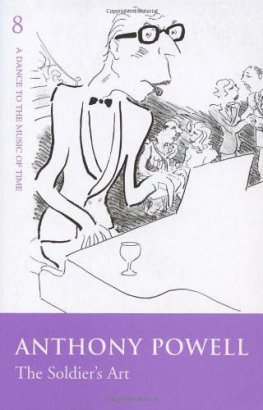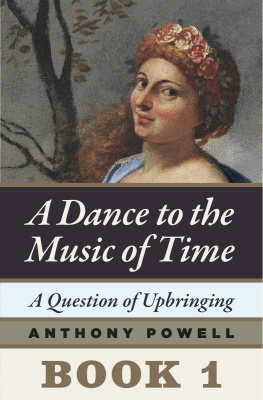Anthony Powell
A Question of Upbringing
THE MEN AT WORK at the corner of the street had made a kind of camp for themselves, where, marked out by tripods hung with red hurricane-lamps, an abyss in the road led down to a network of subterranean drain-pipes. Gathered round the bucket of coke that burned in front of the shelter, several figures were swinging arms against bodies and rubbing hands together with large, pantomimic gestures: like comedians giving formal expression to the concept of extreme cold. One of them, a spare fellow in blue overalls, taller than the rest, with a jocular demeanour and long, pointed nose like that of a Shakespearian clown, suddenly stepped forward, and as if performing a rite, cast some substance apparently the remains of two kippers, loosely wrapped in newspaper on the bright coals of the fire, causing flames to leap fiercely upward, smoke curling about in eddies of the north-east wind. As the dark fumes floated above the houses, snow began to fall gently from a dull sky, each flake giving a small hiss as it reached the bucket. The flames died down again; and the men, as if required observances were for the moment at an end, all turned away from the fire, lowering themselves laboriously into the pit, or withdrawing to the shadows of their tarpaulin shelter. The grey, undecided flakes continued to come down, though not heavily, while a harsh odour, bitter and gaseous, penetrated the air. The day was drawing in. For some reason, the sight of snow descending on fire always makes me think of the ancient world legionaries in sheepskin warming themselves at a brazier: mountain altars where offerings glow between wintry pillars; centaurs with torches cantering beside a frozen sea scattered, unco-ordinated shapes from a fabulous past, infinitely removed from life; and yet bringing with them memories of things real and imagined. These classical projections, and something in the physical attitudes of the men themselves as they turned from the fire, suddenly suggested Poussins scene in which the Seasons, hand in hand and facing outward, tread in rhythm to the notes of the lyre that the winged and naked greybeard plays. The image of Time brought thoughts of mortality: of human beings, facing outward like the Seasons, moving hand in hand in intricate measure: stepping slowly, methodically, sometimes a trifle awkwardly, in evolutions that take recognisable shape: or breaking into seemingly meaningless gyrations, while partners disappear only to reappear again, once more giving pattern to the spectacle: unable to control the melody, unable, perhaps, to control the steps of the dance. Classical associations made me think, too, of days at school, where so many forces, hitherto unfamiliar, had become in due course uncompromisingly clear.
*
As winter advanced in that river valley, mist used to rise in late afternoon and spread over the flooded grass; until the house and all the outskirts of the town were enveloped in opaque, chilly vapour, tinted like cigar-smoke. The house looked on to other tenement-like structures, experiments in architectural insignificance, that intruded upon a central concentration of buildings, commanding and antiquated, laid out in a quadrilateral, though irregular, style. Silted-up residues of the years smouldered uninterruptedly and not without melancholy in the maroon brickwork of these medieval closes: beyond the cobbles and archways of which (in a more northerly direction) memory also brooded, no less enigmatic and inconsolable, among water-meadows and avenues of trees: the sombre demands of the past becoming at times almost suffocating in their insistence.
Running westward in front of the door, a metalled road continued into open country of a coarser sort than these gothic parklands fields: railway arches: a gas-works: and then more fields a kind of steppe where the climate seemed at all times extreme: sleet: wind: or sultry heat; a wide territory, loosely enclosed by inflexions of the river, over which the smells of the gasometer, recalled perhaps by the fumes of the coke fire, would come and go with intermittent strength. Earlier in the month droves of boys could be seen drifting in bands, and singly, along this trail, migrating tribes of the region, for ever on the move: trudging into exile until the hour when damp clouds began once more to overwhelm the red houses, and to contort or veil crenellations and pinnacles beyond. Then, with the return of the mist, these nomads would reappear again, straggling disconsolately back to their deserted habitations. By this stage of the year exercise no longer contestable five days a week the road was empty; except for Widmerpool, in a sweater once white and cap at least a size too small, hobbling unevenly, though with determination, on the flat heels of spiked running-shoes. Slowly but surely he loomed through the dusk towards me as I walked back well wrapped-up, I remember from an expedition to the High Street. Widmerpool was known to go voluntarily for a run by himself every afternoon. This was his return trotting across the plough in drizzle that had been falling since early school. I had, of course, often seen him before, because we were in the same house; even spoken with him, though he was a bit older than myself. Anecdotes relating to his acknowledged oddness were also familiar; but before that moment such stories had not made him live. It was on the bleak December tarmac of that Saturday afternoon in, I suppose, the year 1921 that Widmerpool, fairly heavily built, thick lips and metal-rimmed spectacles giving his face as usual an aggrieved expression, first took coherent form in my mind. As the damp, insistent cold struck up from the road, two thin jets of steam drifted out of his nostrils, by nature much distended, and all at once he seemed to possess a painful solidarity that talk about him had never conveyed. Something comfortless and inelegant in his appearance suddenly impressed itself on the observer, as stiffly, almost majestically, Widmerpool moved on his heels out of the mist.
His status was not high. He had no colours, and although far from being a dunce, there was nothing notable about his work. At this or any other time of year he could be seen training for any games that were in season: in winter solitary running, with or without a football: in summer, rowing courses on the river, breathing heavily, the sweat clouding his thick lenses, while he dragged his rigger through the water. So far as I know he never reached even the semi-finals of the events for which he used to enter. Most of the time he was alone, and even when he walked with other boys he seemed in some way separate from them. About the house he was more noticeable than in the open air, because his voice was pitched high and he articulated poorly: as if tongue were too big for mouth. This delivery made his words always appear to protest, a manner of speaking almost predictable from his face. In addition to that distinctly noisy manner of utterance, thick rubber reinforcements on soles and heels caused his boots he wore boots more often than what Stringham used to call Widmerpools good sensible shoes to squeal incessantly: their shrill rhythmic bursts of sound, limited in compass like the notes of a barbaric orchestra, giving warning of his approach along the linoleum of distant passages; their sullen whining dirge seeming designed to express in musical terms the mysteries of an existence of toil and abnegation lived apart from the daily life of the tribe. Perhaps he sounds a grotesque and conspicuous figure. In excess, Widmerpool was neither. He had his being, like many others, in obscurity. The gap in age caused most of my knowledge of him to have come second-hand; and, in spite of this abrupt realisation of him as a person that took place on that winter evening, he would have remained a dim outline to me if he had not at an earlier date, and before my own arrival, made himself already memorable as a new boy, by wearing the wrong kind of overcoat.






